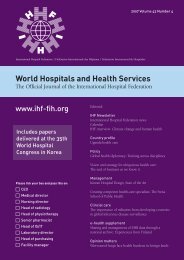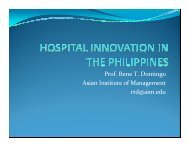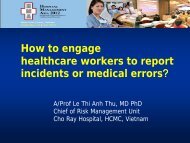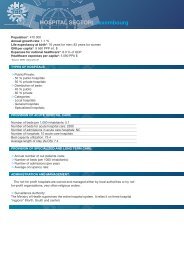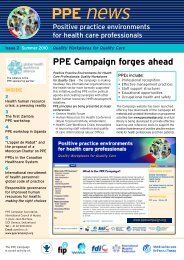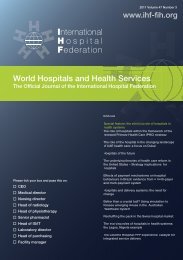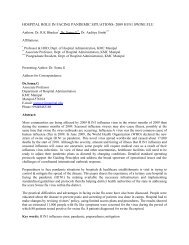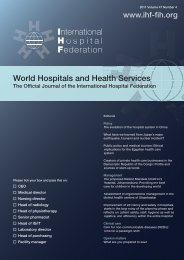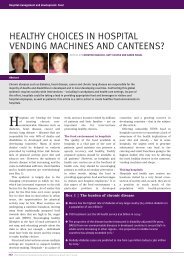Full document - International Hospital Federation
Full document - International Hospital Federation
Full document - International Hospital Federation
You also want an ePaper? Increase the reach of your titles
YUMPU automatically turns print PDFs into web optimized ePapers that Google loves.
Innovations and clinical specialities: oncology<br />
regularly contributes to teaching around cancer within<br />
metropolitan-based AHW training. Others, in partnership with<br />
Indigenous Community Controlled Health Organizations in their<br />
areas, have begun planning to incorporate cancer awareness<br />
into AHW training, but not all discussions have yet resulted in<br />
established commitment. The Cancer Council Victoria (TCCV)<br />
has, since 2001, been delivering training on cancer, screening<br />
and cervical cancer to AHWs undertaking the Certificate 4 in<br />
Women’s and Babies’ health which is delivered by the Victorian<br />
Aboriginal Community Controlled Health Organisation. The<br />
Cancer Council New South Wales (TCCNSW) had organised<br />
one-day training workshops for AHWs covering basic<br />
information about cancer biology, prevention, early detection,<br />
treatment and end of life which were jointly delivered by two<br />
Aboriginal consultants. However, the workshops have not been<br />
systematically and regularly conducted. The organisation now<br />
proposed to develop a more sustainable, organised programme<br />
with regional Aboriginal Health Services (AHSs) interested in this<br />
approach. Implementation may occur by extending the 1-day<br />
training workshop to 2 days, and shifting the focus to include<br />
more practical issues related to cancer care. Lack of availability<br />
of Indigenous-specific resources was mentioned as a barrier to<br />
education about cancer. TCCV has supported development of<br />
many Indigenous-friendly resources addressing smoking<br />
cessation and cervical screening. Respondents were also aware<br />
of resources in the process of development by other<br />
organizations such as The Centre for Excellence in Indigenous<br />
Tobacco Control, and felt that specific resources would be<br />
helpful in address Indigenous needs. It was considered<br />
important to develop educational and outreach materials that<br />
included artwork, pictures, role models and/or stories resonating<br />
culturally with the programme’s target population. It was also<br />
stressed that any resources produced must be appropriately<br />
used, because in some instances, good resources remain underutilised<br />
as a result of inadequate promotion, poor distribution or<br />
inadequate staff training in their appropriate use. Although there<br />
was recognition that resources designed in another jurisdiction<br />
were not always suitable and relevant elsewhere, some<br />
respondents noted a lack of capacity within their organizations in<br />
adapting these or developing new resources.<br />
Education of cancer staff about indigenous people<br />
Training and capacity building are not only necessary for AHWs<br />
and community members. Respondents acknowledged the need<br />
for awareness of Indigenous culture, cultural differences and<br />
beliefs to be taught and understood among the mainstream health<br />
service providers. The QCF runs cultural awareness training for<br />
staff twice a year, with training provided by the Department of<br />
Health and delivered by an Indigenous person. The TCCNSW has<br />
been running 2-day workshops on Indigenous culture for about 5<br />
years, and it is mandatory for all staff. TCCV have organised<br />
cultural awareness training in 2001 and 2005, and they now plan<br />
to deliver it annually.<br />
Cancer prevention education<br />
The focus within cancer prevention was strongest in the area of<br />
tobacco control, and primarily focussed on education and support<br />
initiatives. For instance, TCCWA provides support and advice to<br />
Say No To Smokes, the only Aboriginaltargeted tobacco control<br />
project in WA. Working in collaboration with the Say No To<br />
Smokes team, the partners have now submitted a joint funding<br />
proposal for another project, the brainchild of an Aboriginal exsmoker,<br />
to capture and tell in their own words the success stories<br />
of Indigenous people who have stopped smoking. The Australian<br />
Capital Territory Cancer Council in partnership with Winnunga<br />
Nimmitjah runs a smoking cessation programme No More Bunda<br />
for Indigenous people that includes access to free<br />
nicotinereplacement therapy (NRT). This programme was adapted<br />
from a standard cessation programme and has been running for 5<br />
years. TCCV is working in two programme areas — tobacco<br />
control and cervical screening — to take on an Indigenous-specific<br />
focus, and to train and support AHWs. TCCSA supports and plays<br />
partnership roles with the Aboriginal Health Council of South<br />
Australia to deliver a Quit Skills training programme to AHWs.<br />
TCCNSW appointed an Indigenous representative on the planning<br />
committee for a tobacco control conference and provided 12<br />
scholarships for Indigenous people to attend. In reporting on<br />
successful initiatives, respondents often described relatively smallscale<br />
local or regional initiatives where the kernel of the project<br />
came out of a personal or good relationship between a Cancer<br />
Council member and an Indigenous person working in a local<br />
health service or in the community. Such partnerships recognised<br />
that Indigenous Health Services are experienced in working with<br />
Indigenous people, while the Cancer Councils have expertise<br />
around cancer education and supporting people affected by<br />
cancer. Building relationships and reciprocity through sharing<br />
information and skills between organizations was valued by the<br />
informants. A local or regional approach was seen as better able<br />
to support the diverse needs of the Indigenous population within<br />
each state.<br />
Indigenous employment<br />
Involvement of Indigenous people was acknowledged as a crucial<br />
factor in every aspect of cancerrelated service delivery. However,<br />
only one of the Cancer Councils (TCCV) during the project period<br />
reported having an Indigenous staff member. While some Cancer<br />
Councils had experience in recruiting Indigenous staff,<br />
respondents recognised the inherent problems of appointing one<br />
Indigenous position to provide advice across the organisation.<br />
Based upon their observations and experience, respondents<br />
believed that it was difficult to recruit Indigenous staff with the skills<br />
and knowledge to hit the ground running. One respondent<br />
proposed the merits of two or three part-time positions working<br />
together on one project instead of one person across the whole<br />
organisation.<br />
Respondents were aware of the need to provide orientation,<br />
adequate direction and support to Indigenous staff in the same<br />
way as other staff members, but some noted that there had been<br />
difficulties in achieving this in practice. There were risks of<br />
Indigenous staff members feeling isolated, and either not<br />
performing to their ability or suffering burnout. Some respondents<br />
proposed the need to encourage Indigenous employees to<br />
network with other Indigenous people in the health sector if there<br />
were not other Indigenous employees within the organisation. In<br />
the absence of Indigenous staff members, some organizations are<br />
working with Indigenous volunteers and some with non-<br />
Indigenous staff, generally through linking with Indigenous health<br />
service organizations.<br />
84 <strong>Hospital</strong> and Healthcare Innovation Book 2009/2010



